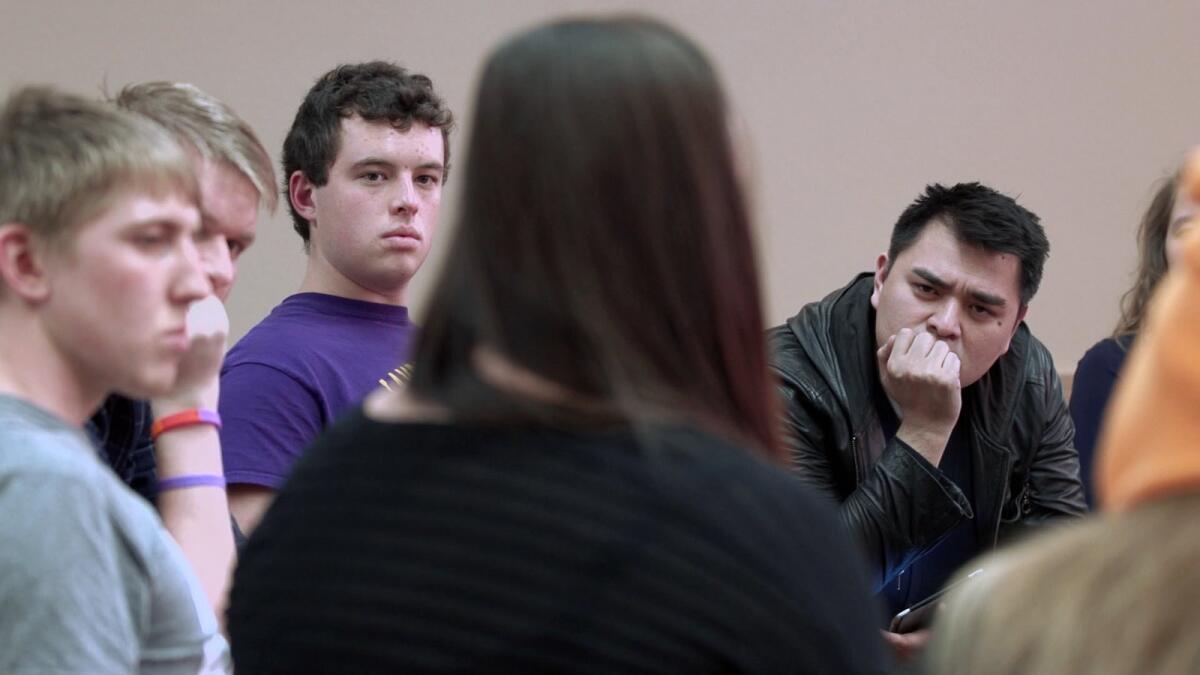‘White People’ explores gray areas in privilege and stereotypes

Filmmaker Jose Antonio Vargas, right, listens to a group of young people during the filming of his documentary “White People.”
- Share via
In an episode of “The Middle” last season, Sue Heck (played by Eden Sher) couldn’t figure out why the guide on her college tour kept steering her to the school’s Native American programs. Turned out, when asked for her race, Sue had checked the wrong box.
“I’m a native of America,” she earnestly explained, before realizing her mistake.
White people, am I right?
Isn’t it funny how you can make a joke about white people, but if you use the term “black people,” you risk being called a racist before you finish your sentence?
Well, maybe not funny so much as perfectly understandable. At no time in U.S. history have white people been persecuted or disenfranchised simply for the color of their skin.
For other things, like being Jewish or Irish or Italian, but not for being white. In fact, as one astute young woman points out in Jose Antonio Vargas’ new MTV documentary “White People,” when the Jews, Irish and Italians first arrived on these shores, they weren’t considered white. Not really. Not in the way “white” has been often defined, the ideal from which all the other races “diverge.”
In fact, the term “white people” didn’t move around in the casual lexicon much until fairly recently, when it became something of a punch line, a reminder that Caucasian is, in fact, just another race whose members might want to know what it feels like to be defined instantly and solely by color.
Not surprisingly, many “white people” don’t like it very much. When MTV announced they would be airing a film called “White People,” conservative pundits hit the roof, predicting an exercise in race-baiting disguised as an exploration of white privilege packaged in a hashtag-worshipping world of the network’s target audience.
It is none of these things.
Instead “White People” begins with the acceptance that most white Americans don’t feel privileged and attempts to explore what they feel instead.
To do this, Vargas (who recently partnered with the Los Angeles Times to create a multimedia digital magazine exploring race and identity called #EmergingUS) speaks with folks who deal with their whiteness in a highly overt way, including:
—Dakota, a Southern gay man, who chose to attend “an historically black college.”
—A group of white teachers on the Pine Ridge Indian reservation near the site of the Wounded Knee massacre in South Dakota.
—John, a young Italian American, and his family watching as “their” Bensonhurst neighborhood in Brooklyn becomes increasingly Asian.
—Katy, a young college student in Arizona who believes she might have had access to more financial aid if she weren’t white.
None of whom, I hasten to add, appear as “in extremis” as they seem when described. If nothing else, “White People” proves that you can take on a sensitive topic in a provocative way and avoid being a provocateur.
Still, it’s a maddeningly brief and hectic road trip. Lasting less than an hour, “White People” seems more like a pilot for a reality series than a documentary. Each stop on the journey could easily sustain its own episode — especially when padded with shots of Vargas meeting larger groups — if the genre weren’t so reliant on overly orchestrated encounters, manipulative production and absurd histrionics.
Some of which make their presence felt there — the soundtrack insists on reminding everyone how they should be feeling — though at levels so low the MTV demographic probably won’t notice. “White People” clearly prides itself on being frank about things that too often fester.
“A lot of people feel like that,” Vargas says several times in answer to white people reluctantly saying they feel discriminated against or are tired of being made to feel ashamed. “Why do you feel like that?”
But if brevity forces the narrative to skim, it does not skirt. A dinner in which Dakota brings his black friends from college to dinner with his white family is just as odd and uncomfortable as you would imagine, while the widely felt concern that whites don’t have the same scholarship opportunities as other races is debunked gently but firmly.
Vargas is a Filipino citizen who in 2011 revealed that he was here illegally, which makes it natural to assume that he has, well, some skin in this particular game.
He does, but the whole point of “White People” is that we all do. As the recent outrage over the use of the word “diversity” as shorthand for the inclusion of races other than Caucasian makes clear, it is time we stop thinking of white as the base to which other colors may or may not be added.
In these terms, “White People” is more conversation starter than a revelation, but the conversations it could start are limitless and important. Watching a white woman describe her privilege as never having been institutionally oppressed is enough to make a feminist scream, and surely Dakota’s experience as a gay man tempers his experience of life as much as his whiteness.
None of us are one thing or another, so defining anyone solely by their race is ridiculous. Which explains why the joking use of the term “white people” has become popular and the film “White People,” though imperfect, is worth watching.
More to Read
The complete guide to home viewing
Get Screen Gab for everything about the TV shows and streaming movies everyone’s talking about.
You may occasionally receive promotional content from the Los Angeles Times.







